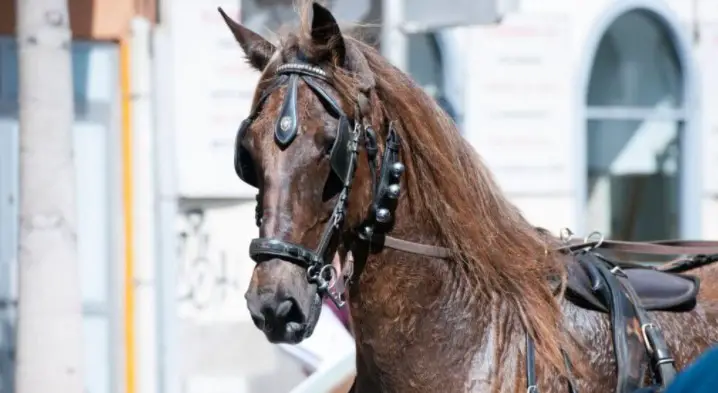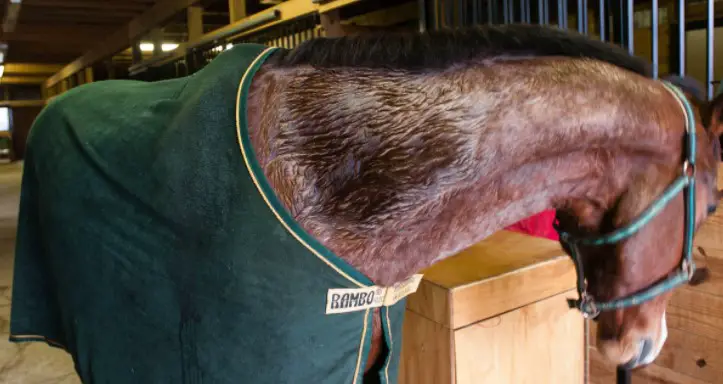Horses are known to be fast and active animals, whether on a farm or racing field. In fact, well-cared-for horses boast the endurance to run as far as 100 miles in just 24 hours. With so much strength and endurance, and activity that they get up to, it is normal to question whether they sweat or not.
For many mammals, sweating is an integral part of cooling and thermoregulation. As mammals experience hot weather, humidity, and intense activities, heat production plays a significant role in balancing the body’s environment.
Like humans and other mammals, horses do sweat through their sweat glands. As active animals, sweating for horses acts as an essential cooling process to relieve the heat build-up in their body.
In fact, horses sweat in different circumstances depending on what their bodies experience. Generally, you should expect your horse to sweat during and after intense activities like exercises. In addition to that, you will also notice that your horse sweats when nervous, in pain, or under threat. However, your horse doesn’t only sweat in strenuous conditions. So, you may even notice them sweat when being tailored. Like humans, even the hot weather can trigger your horse to sweat.
Sweating serves as an excellent sign that you have a healthy horse, so if your horse doesn’t sweat at all, it’s a pretty good indicator that they are unhealthy or sick. There is a specific term that describes this condition. Horses that don’t sweat at all or as much as their herd mates suffer from a thermoregulatory system problem called anhidrosis.
In this case, anhidrotic horses require indoor confinement or need to be kept in cooled shaded areas. They will also require a consistent flow of cool air and several baths a day.
How Do Horses Sweat?
Like other mammals, horses depend on cellular metabolism to sweat. Their bodies break down the food they consume to release energy for movement and other activities. The muscle cells in the body generate heat as a by-product of the metabolism.

Thus, the heat has to leave the body to balance their body temperature and environment. Horses dissipate this heat through breathing and their skin. Their bodies also experience an increased heat output when they are active, nervous, or in pain. Similarly, perspiration has to complement breathing and the skin to help remove the excess heat.
However, horse sweat varies from that of humans since it contains water dissolved with more electrolytes and minerals than humans. In fact, horses that sweat excessively tend to release white foam or lather between the hind legs and on the neck. This may be a sign that your horse loses a lot of electrolytes.
Do I Need To Monitor My Horse’s Sweating?
Horse owners are advised to keep track of how much their horses sweat. Having an idea of how much your horse sweats allows you to replenish them with adequate fluid and electrolytes. This helps them make up for the fluids lost during sweating.

While this may be easy in theory, it’s not the same in practice. Obviously, you cannot account for every drop of sweat! Instead, it would be best to determine your horse’s sweating pattern based on the activity.
Most horse owners consider if the activity was light, moderate, or heavy. Once you fully acquaint yourself with your horse, you can very easily determine how each type of activity affects their fluid loss.
How Much Fluids Should A Horse Drink?
As a general rule of thumb, horses should drink 10 to 20 gallons of water per day. The water content should match the body size and activity of the horse. A horse performing moderate to intense work loses 2.6 to 3 gallons of water per hour. This translates to about 10% of its body weight in sweat. However, in hot and humid conditions, the rate of sweat loss increases by 50% to 100%.
Therefore, the rate at which your horse sweats can be affected by weather and climate conditions, the intensity of the activities, the longevity/duration of the activity, and the horse’s health and fitness level.
When your horse doesn’t get adequate water and electrolyte replenishment after sweating, it can lead to dehydration, tiredness, muscular weakness, and an increase in body temperature.
How Do I Cool My Horse Down?
Undoubtedly, a healthy horse must sweat as part of the cooling process. But, you don’t want your horse to lose too many fluids and electrolytes from its body. So, here are the best ways to ensure your horse cools down fast;
Step 1: Allow Them To Rest
After intense exercise, allow your horse to cool down. You can do so by walking them until their breathing slows to normal. It will take you a little longer to cool your horse down in a warmer and humid climate. Additionally, factors such as fitness, longevity, and activity intensity will determine the cooling downtime.
Step 2: Clean Them Up
After walks to cool down, you can give your horse a quick wash. Simply put your horse in cross ties, remove the tack, and give them a quick bath or squirt with a wet squeegee. Alternatively, you can use a specially designed horse shower for faster cooling down results. Using a horse shower lets you wash your horse’s sweat off with warm water.
The best part of using a portable horse shower is that you can use it anywhere, and it thoroughly removes sweat residues. The warm water from the shower effectively removes sweat residues, reducing the risks of your horse developing any skin conditions. On the other hand, the warm water also helps to soothe their skin and muscle soreness.
Step 3: Replenish What’s Lost
When rehydrating your horse, don’t focus on the water alone. Remember, a horse’s sweat contains numerous minerals and electrolytes. So, you want to replenish what was lost in the sweat.
You can find many commercially produced horse electrolytes available on the market for your horse. Ensure the horse receives water treated with electrolytes and a good supply of untreated water.
Conclusion
A horse’s sweat is a good indicator of its health; it means that your horse’s system is efficient. Like humans, you don’t want your horse to sweat excessively. After all, this may cause the rise of unwanted problems like dehydration, muscular weakness, and overheating.
So, whether you are on a trail ride or working the farm, you have to keep your horse hydrated all day long. You shouldn’t get back to the barn before you feed them adequate water and electrolytes. Additionally, cooling down your horse should also be a habitual practice to prevent excessive sweating. Allowing your horse to cool down helps them relax and protect them from diseases that may arise from dehydration or sweat residue build-up.
